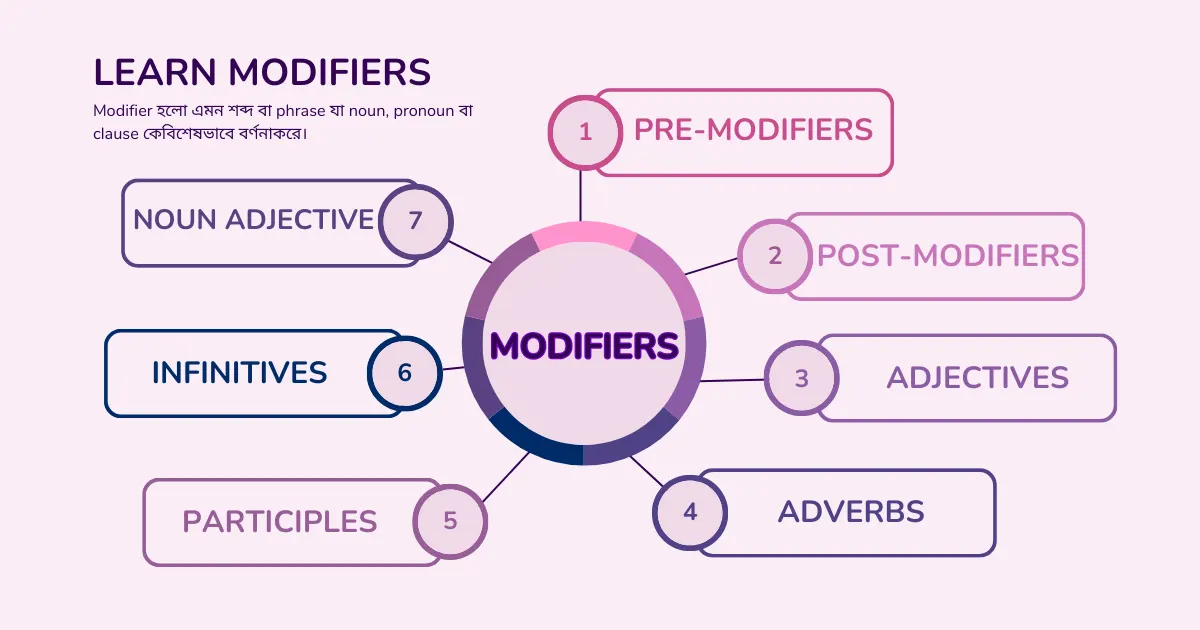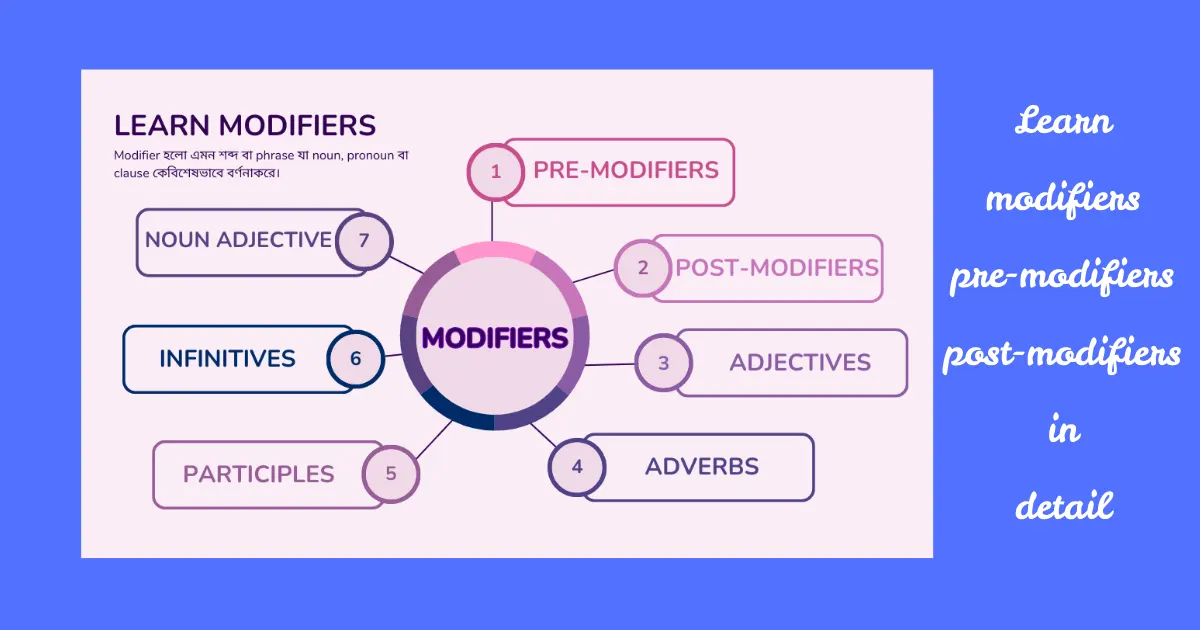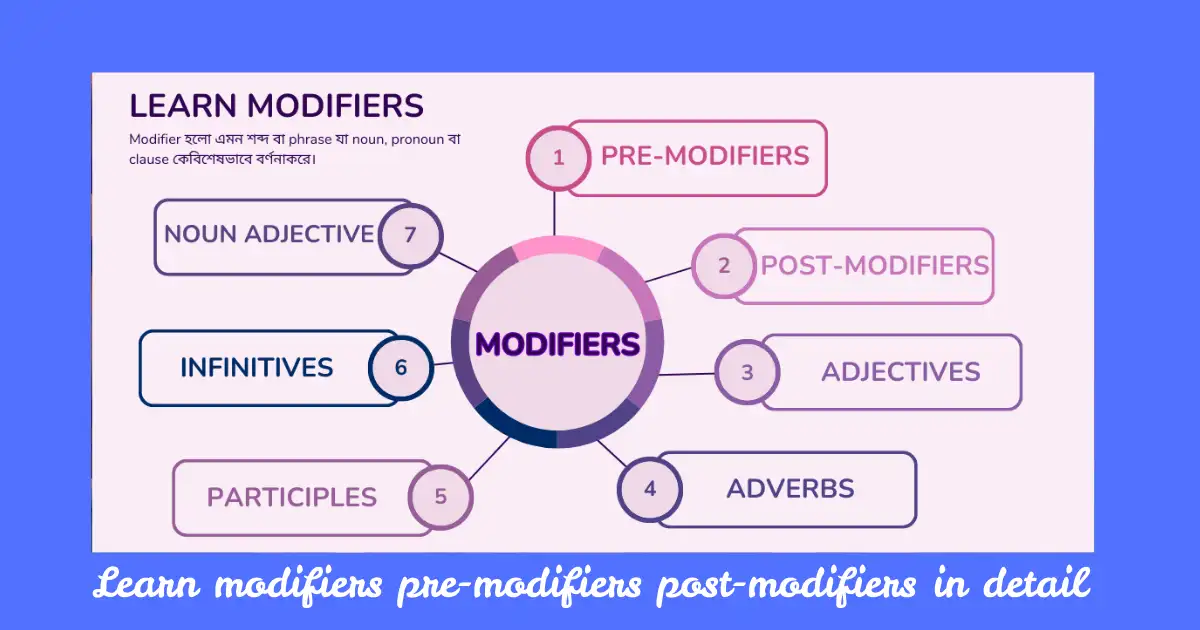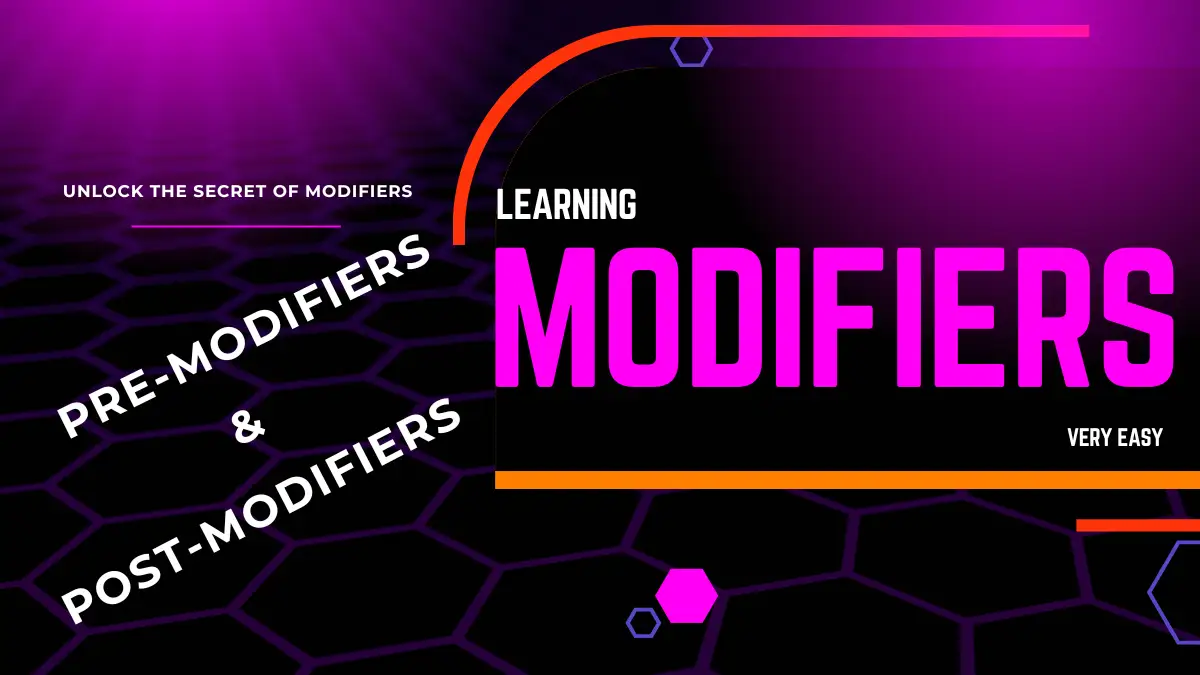Modifier হলো এমন একটি word, phrase বা clause যা অন্য word, phrase বা clause কে বিশেষভাবে বর্ণনা, ব্যাখ্যা বা সীমাবদ্ধ করে। এটি বাক্যে অতিরিক্ত তথ্য যোগ করে অর্থকে আরও স্পষ্ট করে। ইংরেজি লেখায় সঠিক Modifier ব্যবহারে বাক্যের মান উন্নত হয়।

এই আর্টিকেলে আমরা Modifiers এর সংজ্ঞা, শ্রেণিবিভাগ, Pre-modifiers ও Post-modifiers এর বিস্তারিত নিয়ম, উদাহরণ এবং প্র্যাকটিস একসাথে দেখব।
Top 20 Essential Adjective Examples in Real Sentences
Definition of Modifier:
Modifier হলো এমন শব্দ বা phrase যা noun, pronoun বা clause কে বিশেষভাবে বর্ণনা করে।
Examples:
- A beautiful garden. (beautiful হলো modifier যা garden কে বর্ণনা করছে)
- The boy who is reading a book is my brother. (who is reading a book হলো post-modifier)
Classification of Modifiers:
Modifiers দুই ভাগে বিভক্ত:
- Pre-modifier: মূল শব্দের আগে বসে।
- Post-modifier: মূল শব্দের পরে বসে।
Pre-modifiers:
Definition: যে modifier noun, pronoun বা অন্য শব্দের আগে বসে তাকে Pre-modifier বলে।
Types & Rules of Pre-modifiers
| Rule | Definition | Example | Practice Exercise |
| 1. Adjective as Pre-modifier | Adjective সাধারণত noun এর আগে বসে তাকে qualify করে | She bought a red dress. | 1. He is a ____ man. 2. We stayed in a ____ hotel. 3. She adopted a ____ puppy. 4. They live in a ____ house. 5. Rina wore a ____ saree at the wedding. 6. I had a ____ dream last night. 7. He showed me a ____ picture. 8. The old man told us a ____ story. 9. She has a ____ voice. 10. They took a ____ road to the village. |
| 2. Noun as Pre-modifier | কোনো noun আরেকটি noun-এর আগে বসে তাকে বিশেষায়িত করে | I bought a chicken soup. | 1. He is my ____ teacher. 2. I love ____ juice. 3. We visited the ____ library yesterday. 4. She bought a ____ bag from the market. 5. They live in a ____ house near the river. 6. I need a ____ book to study. 7. The ____ park is very beautiful. 8. He is a ____ player in our team. 9. We ate ____ cake after dinner. 10. She wore a ____ dress at the party. |
| 3. Participle as Pre-modifier | Present participle (ing) বা past participle (ed) noun এর আগে বসে | A smiling child / A broken glass | 1. He picked a ____ flower. 2. We met a ____ man. 3. She showed me a ____ picture. 4. I saw a ____ child in the park. 5. They entered a ____ room. 6. He wore a ____ shirt yesterday. 7. We heard a ____ bird singing. 8. The boy found a ____ wallet on the road. 9. She gave me a ____ book to read. 10. I noticed a ____ cat near the garden. |
| 4. Adverb/Intensifier as Pre-modifier | Adverb adjective বা অন্য modifier এর আগে বসে noun কে qualify করে | She is a very beautiful girl. | 1. He is a ____ intelligent boy. 2. The task is ____ difficult. 3. She is a ____ talented singer. 4. It was a ____ exciting match. 5. They live in a ____ beautiful house. 6. He is a ____ hardworking student. 7. The movie was ____ interesting. 8. I found the problem ____ complicated. 9. She gave me a ____ useful book. 10. This is a ____ important decision. |
| 5. Possessive/ Determiner as Pre-modifier | Possessive pronoun বা determiner noun এর আগে বসে | This is my book. | 1. ____ pen is on the table. 2. I like ____ flowers. 3. ____ bag is very heavy. 4. ____ students are very clever. 5. ____ house is near the river. 6. ____ car is new. 7. ____ apples are sweet. 8. ____ teacher is very kind. 9. ____ books belong to me. 10. ____ boy is standing at the door. |

Master Pronouns Fast: 7 Easy Steps to Clarity
4. Post-modifiers:
Definition: যে modifier মূল শব্দের পরে বসে তাকে Post-modifier বলে।
Types & Rules of Post-modifiers
| Rule | Definition | Example | Practice Exercise |
| 1. Prepositional Phrase as Post-modifier | Prepositional phrase noun এর পরে বসে তাকে ব্যাখ্যা করে | The book on the table is mine. | 1. I saw a cat ____ 2. The girl ____ is my friend. 3. The book ____ is very interesting. 4. He met a man ____ yesterday. 5. The students ____ are very attentive. 6. I bought a chair ____ for the living room. 7. The dog ____ is barking loudly. 8. The shop ____ sells fresh fruits. 9. She saw a bird ____ flying high. 10. The house ____ is painted white. |
| 2. Infinitive Phrase as Post-modifier | “To + verb” phrase noun এর পরে বসে | I need a pen to write. | 1. He has something ____ 2. This is a good place ____ 3. I need a pen ____ 4. She has a lot of work ____ 5. This is a book ____ 6. He found a solution ____ 7. They want a place ____ 8. I have a friend ____ 9. She bought a cake ____ 10. We need someone ____ |
| 3. Relative Clause as Post-modifier | Relative pronoun (who, which, that) দিয়ে clause noun এর পরে বসে | The man who is reading a book is my father. | 1. The boy ____ is my cousin. 2. The pen ____ is lost. 3. The woman ____ is my teacher. 4. The car ____ is very fast. 5. The house ____ is very old. 6. The man ____ helped me is very kind. 7. The students ____ are in the library. 8. The dog ____ is barking loudly. 9. The book ____ is on the table. 10. The girl ____ won the prize is my friend. |
| 4. Appositive as Post-modifier | Appositive হলো noun বা noun phrase যা মূল noun এর পরে বসে তাকে পুনরায় বর্ণনা করে | Mr. Rahman, our English teacher, is very kind. | 1. Cox’s Bazar, ____ , is a tourist spot. 2. Mr. Karim, ____ , is my uncle. 3. Dhaka, ____ , is very crowded. 4. Rabindranath Tagore, ____ , was a great poet. 5. Mount Everest, ____ , is the highest peak. 6. My brother, ____ , is an engineer. 7. Sundarbans, ____ , is famous for tigers. 8. Shefali, ____ , is a talented dancer. 9. The Taj Mahal, ____ , attracts many tourists. 10. Einstein, ____ , was a genius physicist. |
| 5. Adverb Phrase as Post-modifier | Adverbial phrase noun বা verb এর পরে বসে তথ্য দেয় | He answered the question very quickly. | 1. The boy speaks ____ 2. He came ____ 3. She completed the work ____ 4. They arrived ____ 5. He solved the problem ____ 6. The children played ____ 7. She answered the question ____ 8. He walked ____ 9. The teacher explained the lesson ____ 10. They went ____ after breakfast. |

Modifiers: Definition, Types & Examples | Learn English
Conclusion:
Modifiers are essential tools in English grammar that make sentences richer, clearer, and more meaningful. By mastering both Pre-modifiers and Post-modifiers, you can express ideas more effectively and improve your fluency in writing and speaking. Whether it’s using adjectives, nouns, participles, or clauses, modifiers help add precision and depth to language.
In this article, we explored the definition, types, and top 10 powerful rules of modifiers with examples and exercises. Regular practice with the given exercises will help you avoid common mistakes and confidently use modifiers in any context.
Remember: a well placed modifier not only makes your sentence grammatically correct but also adds elegance and clarity to your communication.

